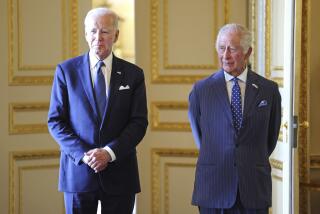Britain, Ireland Agree on Ulster Peace Initiative
- Share via
LONDON — With President Clinton en route for a state visit, Britain and Ireland broke a tense deadlock late Tuesday, agreeing to launch a twin-track search for peace in Northern Ireland.
British Prime Minister John Major and Irish Prime Minister John Bruton announced the initiative at a joint press conference near midnight in the state dining room at 10 Downing Street.
Bruton made the 40-minute flight to London after agreement was reached by phone about 8 p.m. in what Major called “10 days of intensive talks” after months of stalemate.
As a practical matter, the two leaders effectively agreed to set aside their disagreement on the knottiest and most volatile issue in Northern Ireland--arms surrender--in hopes of creating a momentum for peace that will lure all parties.
The two prime ministers said the United States had played no role in the accord. But White House aides say the impending presidential visit, which begins this morning, clearly lent tacit urgency to their negotiations.
“There was no pressure whatsoever from the United States for us to reach an agreement,” Major said.
Standing by his helicopter in the rain Tuesday before departing for London on Air Force One, Clinton hailed the announcement: “I want to salute both these leaders [Major and Bruton] for their vision, their courage and for their leadership for peace.
“This is an opportunity to begin a dialogue in which all views are represented and in which all are heard,” Clinton said.
Major will brief Clinton on the agreement at a two-hour meeting this morning.
On Thursday, Clinton becomes the first sitting American president to visit Northern Ireland, where his visit is awaited as a salute to a fragile 15-month cease-fire.
British analysts said Bruton and Major will now expect Clinton’s help in selling the accord to chary politicians during his three-day visit to England, Northern Ireland and the Irish Republic.
“It was an extremely difficult agreement to reach,” Major said.
The goal of the accord, he said, is to “generate further momentum in the peace process.”
Major and Bruton stressed that while differences remained, the common goal of the two governments is all-party peace talks by February.
Under their agreement, an international panel headed by former U.S. Sen. George Mitchell will advise the two governments on how to achieve surrender of weapons with which Irish Republican Army terrorists waged a 25-year war against British rule in Northern Ireland before declaring a cease-fire Aug. 31, 1994.
“The international body will make an independent assessment of decommissioning. It will consult widely, receive submissions from all parties,” Bruton said. The other commission members were not immediately announced.
Sinn Fein, political arm of the IRA, has rejected British demands for at least a token surrender of weapons before all-party peace talks could begin.
Unionist parties representing the Protestant majority have said they will not negotiate with Sinn Fein without a prior “decommissioning” of arms.
While the Mitchell panel weighs the arms issues, a round of political consultations--the second track--would identify the parties, the means and the agenda of peace talks themselves.
Britain adopted the twin-track approach, supported by the United States, after Sinn Fein resisted all overtures to make even a token surrender of arms from what the British government says is a vast arsenal.
In the aftermath of the surprise announcement early today, it was not immediately clear whether Sinn Fein or the unionists would accept the initiative.
Sinn Fein leader Gerry Adams told Irish radio that he had not been briefed on the agreement before Bruton flew to London on Tuesday night. Neither were unionist leaders aware of the details.
In a view that finds sympathy in Dublin, the IRA says it agreed to a cease-fire, not a surrender, and that the question of arms disposal is one that should be addressed at peace talks.
Britain, backing the unionist parties, says the arms surrender is an important test of the IRA’s commitment to democratic principles.
Last weekend, Adams and Britain’s internal intelligence agency, MI-5, both warned that the cease-fire was in jeopardy.
Major said the threat of renewed violence, however, did not figure in the Anglo-Irish accord reached Tuesday night.
So explosive and potentially fatal to peace hopes is the arms surrender issue that the two governments apparently decided to accept their differences and press on regardless.
More to Read
Sign up for Essential California
The most important California stories and recommendations in your inbox every morning.
You may occasionally receive promotional content from the Los Angeles Times.












